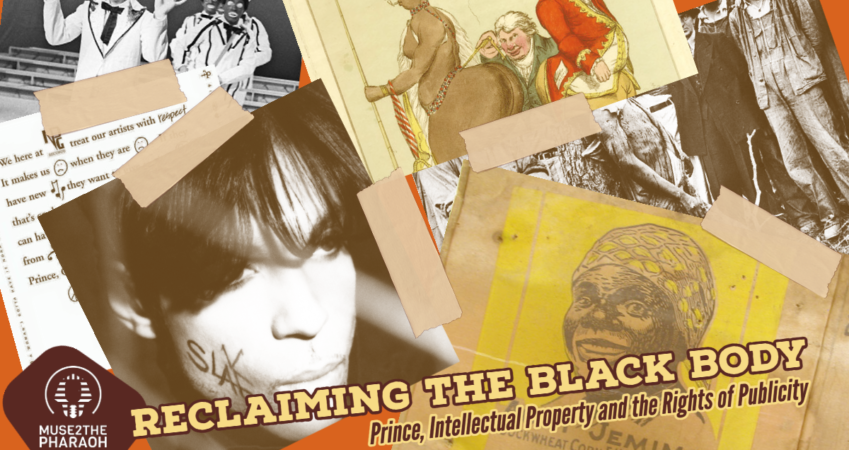
With the outcry about Prince’s estate taking down unauthorized fan merch, commentary on what Prince should or shouldn’t have released, or even fiery opinions about “what he would have wanted”, there is important historical context that should be explored. With special guest Anjali Vats, we place Prince’s crusade for the ownership and control of his own intellectual property in context with the historical struggle of Black people and their agency or lack thereof over their own bodies and bodies of work.
Show Notes
- Prince of Intellectual Property: On Creatorship, Ownership, and Black Capitalism in Purple Afterworlds By Anjali Vats
Abstract : This article focuses on a relatively rarely discussed aspect of Prince’s life: his intellectual property rights politics. Despite seemingly conservative stances on infringement, Prince was an intellectual property radical, one who shaped perceptions of Black creatorship, critiqued the politics of contemporary and historical slavery, and provided space for thinking about new forms of Black capitalism. In particular, Prince’s insistence on exercising creative control in his musical life, having complete authority over his name and the labor associated with it, and managing how and where his music was distributed showcase his commitment to confronting the structural dispossession caused by copyright and trademark law. This article concludes by contending that Prince, during the 2017 Superbowl, was not simply exploited or appropriated by White capitalists but acted as a rebellious spectral presence who continues to confront the “afterlives of slavery.” Prince intrudes on the present in ways that shape the “microclimate”—and potentially shifts “the weather”—of Black creatorship, ownership, and Black capitalism, not without agency, but with the informed resistance of Black fugitivity. - Golden Parachute – Prince
- Muse 2 the Pharaoh : Prince, Black Exceptionalism and the Myth of the Magical Negro
- Exploring the Borders of the IP Land by Anjali Vats
Abstract : Minnesota-born musician Prince Rogers Nelson is often remembered for his contributions to music. Yet he is less often remembered for his contributions to intellectual property rights and digital culture. This paper, which is part of a larger book project on Prince Rogers Nelson entitled Creating While Purple: Prince, Intellectual Properties, and Black Capitalism, examines how Prince created and deployed right of publicity norms through the production and negotiation of a form of conjectural celebrity. I use the term conjectural celebrity to describe the performative identity and management style through which Prince was able to insulate himself from scopic anti-Blackness and cultivate rights of publicity in informal ways. There were three ways that Prince produced this conjectural celebrity: 1) sensory anticipation, 2) collaborative rumormaking, and 3) identity speculation. Through conjectural celebrity, Prince articulated a theory of Black personhood that countered white colonization of privacy and rights of publicity. By mobilizing the power of conjecture as a means of rendering himself more opaque, Prince produced anti-racist legal practice that critiqued the racist visual regime, including spectacular images of Black death, that denied privacy and personhood to Black people. Prince’s intervention demonstrates the need to not only think about human intellectual property landmarks and their impact on the field but also contemplate the shadow performative practices through which people of color create creative, informal legal rights. - Lynching: Violence, Rhetoric, and American Identity By Ersula J. Ore
- Sarah Baartman Exhibition Allows Space for Discourse
- Black Creator Tiktok Strike
- The TikToker Who Created The Viral “Savage” Dance Is Copyrighting The Moves
- Report: How Black Creators Are Taking Their Power Back And Pushing For Protection
- Prince Speech, Academy of Music in Philadelphia, Pennsylvania on September 11, 2000
- Right of Publicity, Identity, and Performance By Kevin Greene
- On Racial Icons: Blackness and the Public Imagination By Nicole Fleetwood
- Liner Notes for the Revolution The Intellectual Life of Black Feminist Sound By Daphne Brooks
- Love and Theft: The Racial Unconscious of Blackface Minstrelsy By Eric Lott
- “Blacksound.” By Matthew Morrison
Abstract : This chapter considers the relationship between philosophy, music, and race through a theory of Blacksound. Blacksound is the sonic and embodied legacy of blackface performance as the origin of popular music, entertainment, and culture in the United States. As a hermeneutic tool, Blacksound is an epistemology designed to historicize and redress how we conceive the formation of race and property laws throughout the nineteenth century via aesthetics. In particular, this tool analyses the construction, consumption, and erasure of black people and blackness out of blackface minstrelsy—the first original form of popular entertainment in North America. Blacksound is an open concept that challenges fixed notions of intellectual property by pointing to the role that the performance of race and the making of racism in popular music plays in copyright laws that have developed throughout the nineteenth century. - Bamboozled Trailer

